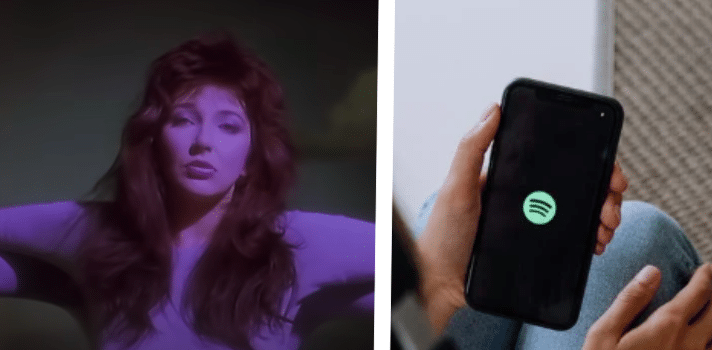In the golden age of TikTok and streaming, new tracks and artists continue to explode with success and popularity. But how much cultural impact do modern hits have, and how do they fair against timeless classics?
If you’ve been anywhere near the Twittwersphere since the latest season of Stranger Things dropped, then you probably know all about the internet’s sudden obsession with Kate Bush’s 1985 track, Running Up That Hill.
The song was recently featured in the highly anticipated fourth season of the Netflix hit show, and since it’s release, the internet generation just can’t seem to get enough. So much so, the song has been storming both domestic (UK) and global charts in the past weeks.
And now, Kate Bush has broken several chart records as Running Up That Hill reaches no. 1 on the UK music charts. Firstly, at 63 years old, Bush is the oldest female to top the chart. Secondly, she now holds the record for longest time for a song to reach no. 1 (37 years – previously held by Wham!’s Last Christmas, which finally made it to no. 1 in January 2021.
Bush’s final record-breaking achievement is the longest gap between no. 1 singles. Her debut single, Wuthering Heights, took the no. 1 spot upon release, but now, 44 years later, Running Up That Hill is topping the charts (it peaked at no. 3 when it was first released).
Bush has since thanked Stranger Things for her recent chart success. “It’s hard to take in the speed at which this has all been happening,” Bush, 63, said in a statement on her website earlier this week:
“So many young people who love the show [are] discovering the song for the first time. The response to Running Up That Hill is something that has had its own energy and volition. A direct relationship between the shows and their audience and one that has stood completely outside of the music business. We’ve all been astounded to watch the track explode!”
Currently the track has an average of 575,000 streams a day in the UK, and 6 million globally. But, ordinarily Bush may not have reached the no. 1 spot if it was not aided by a waiver of a rule which was passed last weekend.
Known as the “accelerated decline” rule, it applies to older songs which was introduced in 2017 following Drake’s 15-week run at no. 1 in 2016 with One Dance. Measures were put in place which meant that new tracks were able to get a moment of glory in the charts. So, whilst every new song earns one “sale” per 100 streams, older songs need 200 streams before a single “sale” is counted.
Without these measures, The Killers’ Mr Brightside (2003), would still be in the top 40, and Ed Sheeran’s Bad Habits would still be in the top 10 for the 47th week in a row.
However, all this shifted last weekend when Bush’s record label, EMI, requested a “manual reset” of streaming ratios, which is available “in exceptional circumstances, where a track is being scheduled for promotion”. Following this reset, Bush’s streams doubled in value and she has since overtaken Harry Styles’ As It Was for the no. 1 spot.
Martin Talbot, the chief executive of the Official Charts Company, emphasised that the rules had not changed. “Kate Bush’s Running Up That Hill has simply been manually reset this week, a process that is available to all artists and used often by record labels during fresh campaign periods and surges of this nature,” he said.
“Running Up That Hill has itself changed things as we know it,” pop chart analyst James Masterton told the Guardian.
“This is the first time in the streaming era that a back-catalogue track has not only been spontaneously resurrected but has maintained its popularity over an extended period. The Kate Bush song has become a genuine sustained smash hit, and for that reason it is appropriate that the rules are waived so it joins contemporary releases on a level playing field. That’s the true game-changer, as it lays down a precedent for other classics to do the same if circumstances merit.”
But with Kate Bush’s surprising new success, it makes us wonder whether contemporary tracks can compete with older hits in terms of cultural impact?
According to data published by MRC, a music-analytics firm, in January 2022, old songs now represent 70% of the U.S. music market. Whilst this is a very daunting statistic for new artists, what makes it worse is that the new-music market is shrinking, with the majority of growth in the market coming from older tracks. (It’s worth noting that only songs released in the past 18 months are classed as new music in the MRC database).
The 200 most popular new tracks now regularly account for less than 5% of total streams, which is less than half of what it was three years ago. And aside from streams, the mix of songs which have actually been purchased by consumers is almost wholly made up older music.
If we look at the list of most-downloaded tracks on iTunes, it’s filled with names of bands from the previous century like The Police, and Creedence Clearwater Revival.
It seems that in the current digital age, never before have new tracks attained hit status whilst simultaneously generating so little cultural impact. What audiences appear to prefer is embracing the hits of decades past instead.
Although success has alway been short-lived in the music business, new releases which become bona fide hits can pass completely unnoticed by much of the population. And this seems to contradict with the whole idea of the pop-culture industry which almost entirely focuses on what’s happening right now.
Whilst a lot of the Baby Boomers will say that the decline in the popularity of new music is a result of lousy new music, it’s just simply not true. If you listen widely, you will know that there are plenty of exceptional new artists and musicians trying to make it, but what’s hindering them is that the music industry is failing to discover and nurture new talents like it did in decades past.
But whilst the modern music industry crumbles under the pressure of catering for an age which seems to change what’s trending every five minutes, past hits haven’t seemed to have lost their impact. And with Kate Bush’s unprecedented success, who knows what will happen to the music industry in the next year or so.















